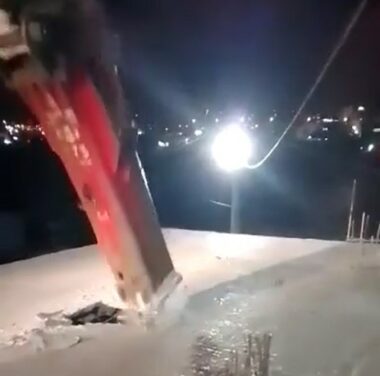JERUSALEM, Thursday, January 13, 2022 (WAFA) – Israeli occupation authorities today forced a Palestinian to self-demolish his store in Shufat refugee camp, northeast of Jerusalem, according to WAFA correspondent.
She said that Jamal Mohammad Ali tore down his commercial store, which had an area of 150 square meters and was still under construction, purportedly for being built without a license.
Ali received a demolition order nine days ago, whereby the Jerusalem municipality gave him the choice to carry out the demolition himself or pay exorbitant fines if the Israeli municipality of Jerusalem carries out the demolition on its own.
Using the pretext of illegal building, Israel demolishes houses on a regular basis to restrict Palestinian expansion in occupied Jerusalem.
Video By Palestine Public Broadcasting Corporation
At the same time, the municipality and government build tens of thousands of housing units in illegal settlements in East Jerusalem for Jews with a goal to offset the demographic balance in favor of the Jewish settlers in the occupied city.
Although Palestinians in East Jerusalem, a part of the internationally recognized Palestinian Territory that has been subject to Israeli military occupation since 1967, they are denied their citizenship rights and are instead classified only as “residents” whose permits can be revoked if they move away from the city for more than a few years.
They are also discriminated against in all aspects of life including housing, employment, and services, and are unable to access services in the West Bank due to the construction of Israel’s separation wall.
According to a report by the Israeli human rights group B’Tselem, the Israeli High Court could be liable for war crimes for their policies that led to the dispossession of Palestinians from their properties in Area C of the West Bank.
The report, Fake Justice, shows that the court’s support of Israeli planning policy is tantamount to support for dispossession and forcible transfer of Palestinians, a war crime under international law.

